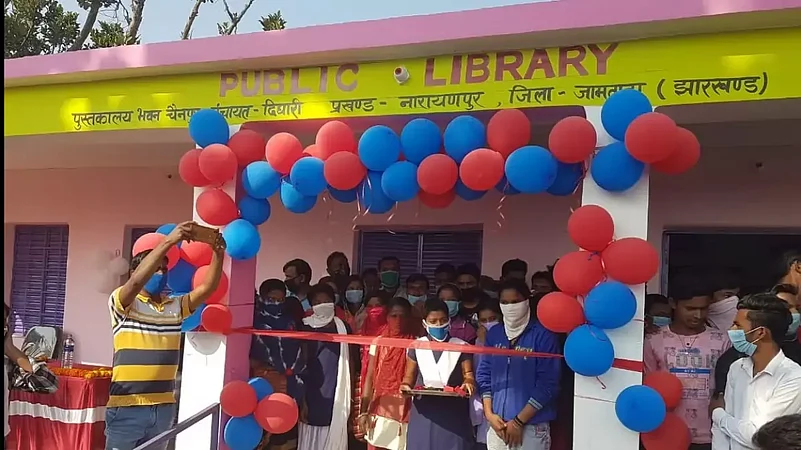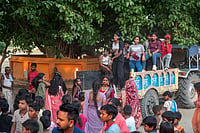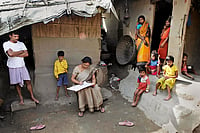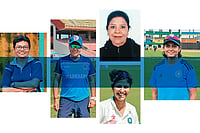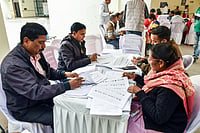Barely three months ago, Shabnam Khaton, a resident of Baratalli Panchayat in Dumka block of Jharkhand, could not write or read. Now, thanks to the district administration-run library in her village, she can write her name and address, put her signature on documents, read short poems and write small passages. An inspired Khaton now feels motivated to complete her metric studies, so that she can teach her daughters, Saba and Sara, who are six and three, respectively. “I will encourage them to become doctors or army officers,” says Khaton.
The library that is running in the Panchayat community building started operating eight months ago. Women from this Panchayat who could not read or write were identified by the Gram Sabha. A few literate women who could teach the rest were also identified. “There are 400 women in the Panchayat who have completed their education in the range of metric to post-graduation. They teach others in the village and we pay them for this,” says Abhijit Sinha, a district administration officer.
For three months, they are taught to read and write basic things and calculations. “Around 8,000 women have benefitted from this so far and have cleared the literacy test. Our objective is to increase the literacy rate of women in Dumka,” informs Sinha.
The literacy rate of Dumka, the sub-capital of Jharkhand, stands at 62.5 per cent. But the literacy rate of women is less than 50 per cent. This initiative by the district administration—of starting libraries in tribal-dominated villages of Dumka as well as the entire state—has already had some success stories.
The initiative is a part of the library campaign being run by the administration. Library centres have been opened in community buildings in each Panchayat. Women gather at these libraries and learn the basics. So far, in the past eight months, the Dumka district administration has spent Rs 20 lakh on the initiative.
Savitri Soren, a resident of Lakarjoriya Panchayat in Dumka, has benefitted from the initiative. She used to work as a daily wager at the Dumka depo. The contractor had not paid her for six months. “The basic calculation I learnt at the centre came in handy. When I calculated, the amount came to Rs 15,000. I mentioned at the centre that I was not being paid, and the teachers over there encouraged me to fight for it. They even contacted the District Collector and then the contractor promptly paid me my dues,” says Soren, 42.
She is very proud of the fact that she can now put her signature on important documents. “I had gone to the labour office. The office functionary asked me for my thumb impression. It felt good to ask for a pen instead,” says Soren.
This may be a relatively new campaign for the women of Dumka, but the tradition of such libraries in Jharkhand is decades old. Between 1950 and 1970, a mobile library in the Santhal Pargana region used to cover a wide range of villages. At that time, the Bihar government—Jharkhand was a part of Bihar then—had started the mobile library project. A special type of vehicle was converted into a library that would distribute books among people in the villages of Santhal Pragana. People would read these books and return them.
However, after 1970, the culture of the library vehicle started losing its charm and eventually, the vehicle came to a halt. In 2022, the district administration got it repaired and moved it to the state library of Dumka. The district administration is making all the effort to impart education to people in the villages. In the last two years, literature festivals have been organised at the state library of Dumka. Many poets, writers and book lovers from across the nation participated in these events.
Anjaneyulu Dodde, the District Collector of Dumka, believes every person has the right to education and change can be brought only through education. “The district administration is working towards making these libraries accessible to each and every child in villages. We have opened libraries in all the 206 Panchayats of the district that are operational at the school level and also stock syllabus as well as competitive exam books,” informs Dodde.
Such libraries are also being opened in the tribal-dominated villages of Gumla district where two libraries are already functional. “We plan to have such libraries in all 159 Panchayats. We have already opened 60 libraries and 12 will be opened at the block level. We have recruited 30 trained teachers and librarians to look after the libraries and guide children,” says Karn Satyarthi, the District Collector of Gumla.
The Jamtara district, which also falls in the Santhal Pargana, has seen considerable progress in setting up these libraries. There are libraries in all the 118 Panchayats of the district. Each library is home to 400 books. There is one teacher in each Panchayat and they take two classes per week to prepare children for the general competitive exams. These libraries were started three years ago by Faiz Ak Ahmad Mumtaj, the former District Collector of Jamtara, just 20 days before he was transferred. The other villages followed suit. Jamtara is considered to be the hub of cybercrime. Mumtaj feels education and these libraries will help the city shed this tag.
Talking about the beginning of the journey, Mumtaj says: “I was on a field visit to the Chengedeh Panchayat in Jamtara. The children were very talented and their IQ was quite high, but there were no educational facilities in the villages. The school drop-out rate was also very high.”
On November 13, 2020, a community library was started in an ideal government building, which kick-started the library campaign and people felt motivated. On Wednesdays and Sundays, expert teachers conduct classes. so far, 30,000 classes have been conducted. I personally know 10 to 15 people who have studied in these libraries and are doing well now.”
The literacy rate in Jharkhand has gone up to 66.41 per cent and these libraries have played a major role in this. Sanjay Kachhap, who has been a part of the library campaign in the tribal villages of Kulhan commissionary for the past 15 years, believes that the literacy rate will further increase with the opening of libraries in villages.
Popularly known as the ‘Library Man’, Kachhap is all praises for the efforts of the district administration. “Having a library in each Panchayat is the need of the hour. Children will be motivated to study and will not indulge in wrongful activities. These libraries will make their base stronger and cracking competitive exams at a later stage will be relatively easy for these children,” he says.
Kachhap, along with his associates, has helped in the opening of a dozen libraries in the interior villages of Jharkhand. Last year, in one of his Mann ki Baat episodes, Prime Minister Narendra Modi appreciated the efforts of Kachhap.
(Translated by Kaveri Mishra)







